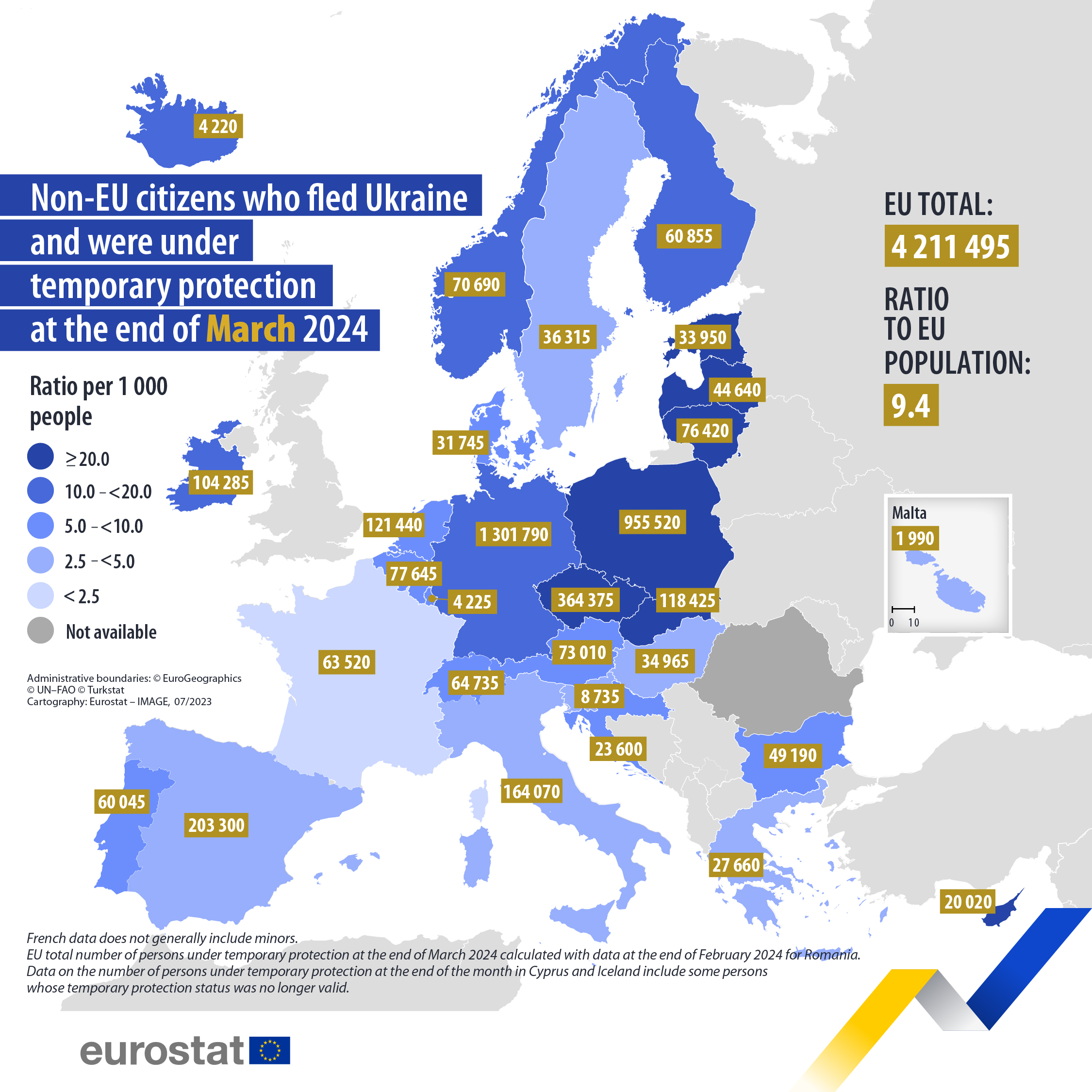People under temporary protection stable at 4.2 million

On 31 March 2024, 4.2 million non-EU citizens, who fled Ukraine as a consequence of the Russian war of aggression against Ukraine that began on 24 February 2022, had temporary protection status in the EU.
At the end of March 2024, the EU countries hosting the highest number of beneficiaries of temporary protection from Ukraine were Germany (1 301 790 people; 30.9% of total EU), Poland (955 520; 22.7%) and Czechia (364 375; 8.7%).
Compared with the end of February 2024, the largest absolute increases in the number of beneficiaries were observed in Germany (+15 210; +1.2%), the Netherlands (+4 705; +4.0%) and Bulgaria (+3 475; +7.6%).
The number of beneficiaries decreased in 9 EU countries, with Czechia (-20 700; -5.4%), Sweden (-9 960; -21.5%), Austria (-9 130; -11.1%), Denmark (-5 385; -14.5%) and Poland (-1 680; -0.2%) registering the largest absolute decreases.
Data presented in this article refer to the attribution of temporary protection status based on the Council Implementing Decision 2022/382 of 4 March 2022, establishing the existence of a mass influx of displaced persons from Ukraine due to the Russian war of aggression against Ukraine, and having the effect of introducing temporary protection.
On 28 September 2023, the European Council agreed to extend the temporary protection for these people from 4 March 2024 to 4 March 2025.
Source datasets: migr_asytpsm and migr_asytpspop
Compared with the population of each EU country, the highest numbers of total temporary protection beneficiaries per thousand people at the end of March 2024 were observed in Czechia (33.7), Lithuania (26.7) and Poland (26.0), whereas the corresponding figure at the EU level was 9.4 per thousand people.
On 31 March 2024, Ukrainian citizens represented over 98% of the beneficiaries of temporary protection. Adult women made up almost half (45.8%) of temporary protection beneficiaries in the EU. Children accounted for almost one-third (32.8%), while adult men comprised slightly more than a fifth (21.4%) of the total.
For more information
- Statistics Explained on temporary protection for persons fleeing Ukraine
- Statistics Explained article on monthly asylum statistics
- Statistics Explained article on annual asylum applications statistics
- Statistics Explained article on annual asylum decisions statistics
- Thematic section on the impact of the war in Ukraine
- Thematic section on migration and asylum statistics
- Database on asylum statistics
- European Commission – Temporary protection
- EU solidarity with Ukraine
Methodological notes
- France: in most cases, minors can stay in France without a permit. Therefore, minors fleeing the war in Ukraine and seeking protection in France are generally not included in statistics on temporary protection.
- Data on the number of persons under temporary protection at the end of the month, until September 2023 (for the Netherlands) and until January 2024 (for Bulgaria), include some persons whose temporary protection status was no longer valid and are not comparable with data of the following reference periods.
- Hungary: data on temporary protection broken down by age group are not available.
- Structures of beneficiaries by age and sex have been calculated based on available data while disregarding the unknown category.
- Temporary protection is a procedure provided only in the event of a mass influx or imminent mass influx of displaced persons from third countries who are unable to return to their country of origin. These people are granted immediate and temporary protection, particularly if there is also a risk that the asylum system will be unable to process the influx without adverse effects for its efficient operation, in the interests of the persons concerned and other persons requesting protection.
- Data presented in this article refer to the granting of temporary protection and not to the registrations for temporary protection, which may precede the process of granting the status. Therefore, the data may not present all persons fleeing Ukraine since the beginning of the Russian war of aggression against Ukraine and who have registered but not yet formally received temporary protection.
If you have any queries, please visit our contact us page.

